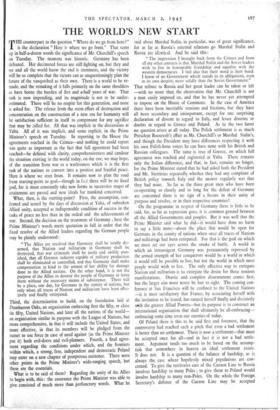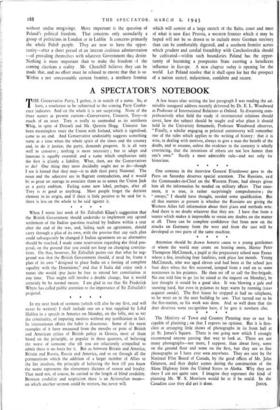THE WORLD'S NEW START
THE counterpart to the question "Where do we go from here?" is the declaration "Here is where we go from." That sums up in half-a-dozen words the significance of Mr. Churchill's speech on Tuesday. The moment was historic. Germany has been defeated. Her decimated forces are still fighting on, but they and we and all the world know the end is imminent, and the victory will be so complete that the victors can as unquestioningly plan the future of the vanquished as their own. There is a world to be re- made, and the remaking of it falls primarily on the same shoulders as have borne the burden of five and a-half years of war. That task is now impending, and its magnitude is not to be under- estimated. There will be no respite for this generation, and none is asked for. The release from the stern effort of destruction and concentration on the construction of a new era for humanity will be satisfaction sufficient in itself to compensate for any sacrifice that may be called for. All that was implicit in the discussions at Yalta. All of it was implicit, and some explicit, in the Prime Minister's speech on Tuesday. In reporting to the House the agreements reached in the Crimea—and nothing he could report was quite as important as the fact that full agreement had been reached—he defined with clarity, comprehensiveness and candour the situation existing in the world today, on the eve, we may hope, of the transition from war to a warlessness which it is the first task of the nations to convert into a positive and fruitful peace. Here is where we start from. It remains now to plan the road from starting-point to goal—though in fact there will be no fixed goal, for it must constantly take new forms as successive stages of attainment are passed and new ideals for mankind conceived.
What, then, is the starting-point? First, the assumption, con- firmed and tested by the days of discussion at Yalta, of unbroken Allied unity, accepted as indispensable condition of success in the tasks of peace no less than in the ordeal and the achievements of war. Second, the decision on the treatment of Germany ; here the Prime Minister's words merit quotation in full in order that the fixed resolve of the Allied leaders regarding the German people may be plainly understood: "The Allies are resolved that Germany shall be totally dis- armed, that Nazism and militarism in Germany shall be destroyed, that war criminals shall be justly and swiftly pun- ished, that all German industry capable of military production shall be eliminated or controlled, and that Germany shall make compensation in kind to the utmost of her ability for damage done to the Allied nations. On- the other hand, it is not the purpose of the Allies tu destroy the people of Germany or leave them without the necessary means of subsistence. There will be a place, one day, for Germans in the comity of nations, but only when all traces of-Nazism and militarism have been effec- tively and finally extirpated.
Third, the determination to build, on the foundation laid at Dumbarton Oaks, an organisation embracing first the fifty, or close 6n fifty, United Nations, and later all the nations of the world— an organisation similar in purpose with the League of Nations, but more comprehensive, in that it will include the United States, and more effective, in that its members will be pledged from the outset to use force in case of need against (as the Prime Minister put it) both evil-doers and evil-planners. Fourth, a final agree- ment regarding the conditions under which, and the frontiers within which, a strong, free, independent and democratic Poland may enter on a new chapter of prosperous existence. There were other points in the Prime Minister's wide-ranging speech, but these are the essentials.
What is to be said of them? Regarding the unity of the Allies to begin with, this: the assurance the Prime Minister was able to give consisted of much more than perfunctory words. What he said about Marshal Stalin, in particular, was of great significance, for as far as Russia's external relations go Marshal Stalin and Russia are identical. And he said this: "The impression I brought back from the Crimea and from all my other contacts is that Marshal Stalin and the Soviet leaders
wish to live in honourable friendship and equality with the western democracies. I feel also that their word is their bond. I know of no Government which stands to its obligations, even
in its own despite, more solidly than the Soviet Government." That tribute to Russia and her great leader can be taken or left —with no more than the observation that Mr. Churchill is not a man easily imposed on, and that he has never yet attempted to impose on the House of Commons. In the case of America there have been inevitable tensions and frictions, but they have all been secondary and unimportant, except for one surprising declaration of dissent in regard to Italy, and lesser dissents or doubts in regard to Greece and Poland. As to the two latter no question arises at all today. The Polish settlement is as much President Roosevelt's affair as Mr. Churchill's or Marshal Stalin's, and though the President may have differences respecting it with his own Polish-born voters he can have none with his British and Russian colleagues. The same is true of Greece, on which full agreement was reached and registered at Yalta. There remains only the Italian difference, and that, in fact, remains no longer, for the Prime Minister stated that he had asked both the President and Mr. Stettinius repeatedly whether they had any complaint of British policy towards Italy and the answer regularly was that they had none. So far as the three great men who have been co-operating so closely and so long for the defeat of Germany are concerned there is no sign of a fissure in their unity of purpose and resolve, or in their respective countries!
On the programme in respect of Germany there is little to be said, for, so far as repression goes, it is common ground between all the Allied Governments and peoples. But it was well that the Prime Minister said what he did—it would have done no harm to say a little more—about the place that would be open for Germans in the comity of nations when once all traces of Nazism and militarism had been extirpated. For that is the goal on which we must set our eyes across the smoke of battle. A world in which an intransigent Germany was permanently repressed by the armed strength of her conquerors would be a world in which it would still be possible to live, but not the world in which most people would wish to live. The only effective way to extirpate Nazism and militarism is to extirpate the desire for those noxious manifestations. Drastic and complete disarmament comes first, but the larger aim must never be lost to sight. The coming con- ference at San Francisco will be confined to the United Nations —it is most satisfactory that France, by associating herself with the invitation to be issued, has ranged herself finally and decisively with the greater Allied Powers—but its purpose is to construct an international organisation that shall ultimately be all-embracing- embracing some time even our enemies of today.
Of Poland there is this to be said first and foremost, that the controversy had reached such a pitch that even a bad settlement is better than no settlement. There is now a settlement—that must be accepted once for all—and in fact it is not a bad settle- ment. Argument tends too much to be based on the assump- doh that somewhere in heaven an ideal settlement exists. It does not. It is a question of the balance of hardship, as is always the case where hopelessly mixed populations are con- cerned. To give the territories east of the Curzon Line to Russia involves hardship to many Poles ; to give them to Poland would involve hardship to many non-Poles. On the whole the Foreign Secretary's defence of the Curzon Line may be accepted without undue misgivings. More important is the question of Poland's political freedom. That concerns only secondarily a group of politicians in London or in Lublin It concerns primarily the whole Polish people. They are now to have the oppor- tunity—after a short period of an interim coalition administration —of providing themselves with whatever Government they desire. Nothing is more important than to make the freedom of the coming .elections a reality. Mr. Churchill believes they can be made that, and no effort must be relaxed to ensure that that is so. Within a not unreasonable eastern frontier, a northern frontiet which will consist of a large stretch of the Baltic coast and most of what is now East Prussia, a western frontier which it may be hoped will not be so drawn as to include more German territory than can be comfortably digested, and a southern frontier across which prudent and cordial friendship with Czechoslovakia should be cultivated—within such boundaries Poland has the oppor- tunity of becoming a prosperous State exerting a beneficent influence in Europe. A new chapter today is opening for the world. Let Poland resolve that it shall open for her the prospect of a nation united, industrious, confident and secure.



























 Previous page
Previous page